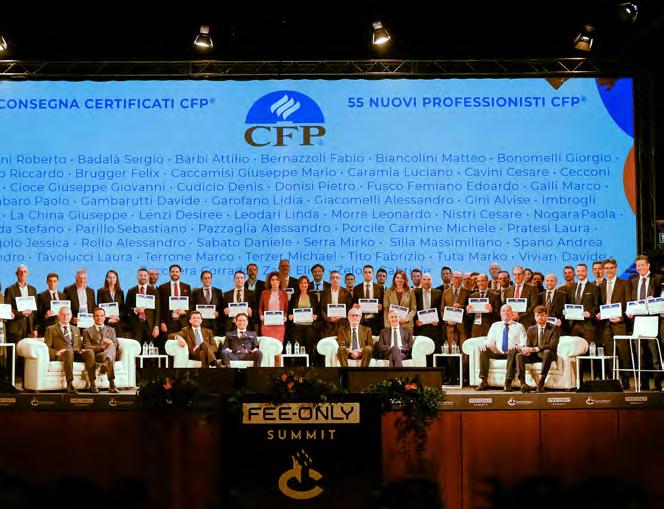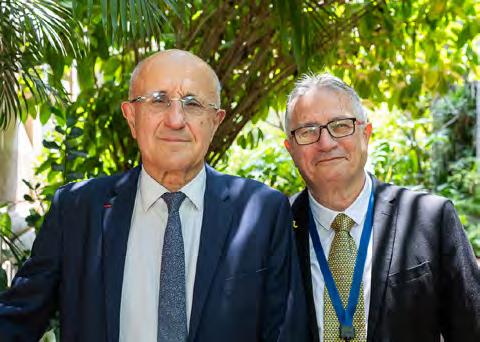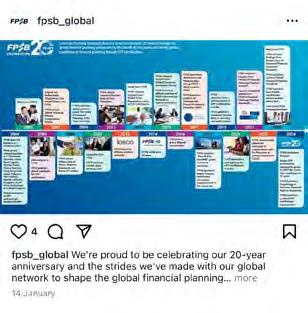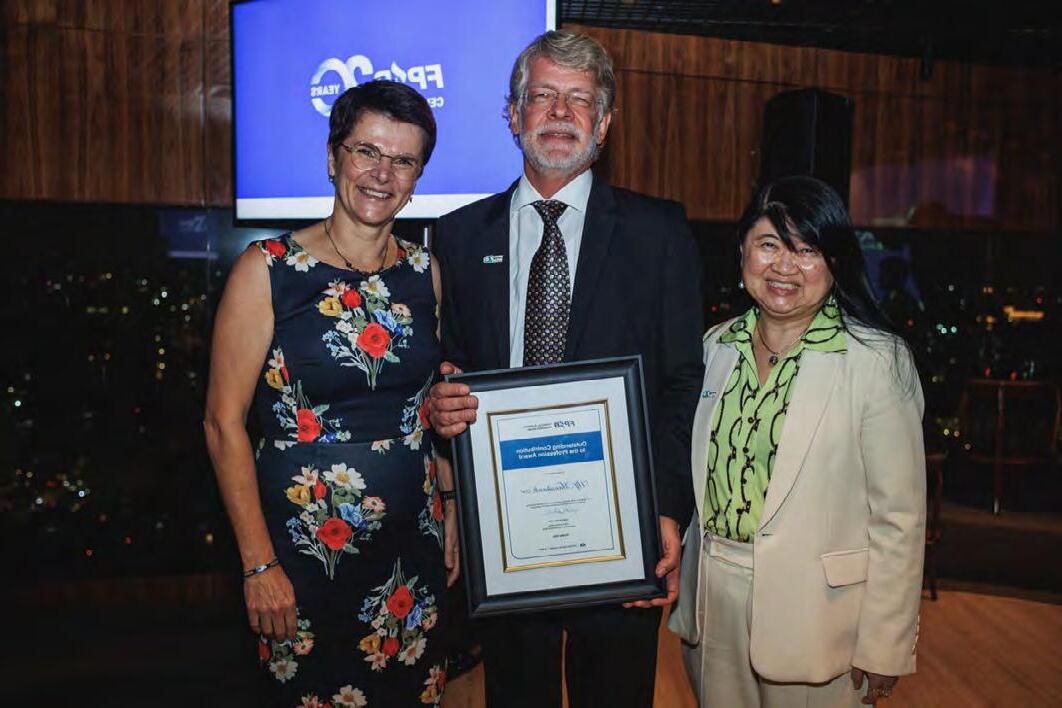




Financial Planning Standards Board is proud to celebrate 20 years of leading the global financial planning profession for the benefit of the public and driving global excellence in financial planning through CFP certification.
China joins FPSB

Ireland the Netherlands Thailand and the United States join FPSB
FPSB adopts Global Financial Planner Competency Profile
FPSB publishes global position paper, The State of Financial Planning in the ‘Post-Trust’ Era
FPSB adopts Financial Planner Duty of Care Principles

Israel joins FPSB
FPSB releases insights from Global Firms Research on value of CFP certification

FPSB releases insights from Global Consumer Awareness Survey
FPSB becomes affiliate member of OECD International Network on financial education

FPSB hosts first World Financial Planning Day during IOSCO World Investor Week
FPSB becomes member of International Forum for Investor Education (IFIE)

FPSB releases insights from Future of Financial Planning Practice research
Italy joins FPSB
FPSB releases findings from Global Value of Financial Planning Consumer Research
FPSB publishes updated Global Financial Planning Standards
FPSB assumes direct administration of CFP certification in India
FPSB publishes Guidance Practice Note on advising vulnerable clients
FPSB opens for business on 1 December 2004
FPSB global network launches in 17 territories: Australia, Austria, Brazil, Canada, Chinese Taipei, France, Germany, Hong Kong, India, Japan, Malaysia, New Zealand, Republic of Korea, Singapore, South Africa, Switzerland and United Kingdom Global community of CFP professionals stands at 89,690


adopts




Launch of updated guidance to FPSB’s Financial Planning Practice Standards Indonesia joins FPSB
FPSB updates global standards for CFP certification
Code of Ethics, Practice Standards and Rules of Conduct

FPSB launches Asia-Pacific certification across borders online tool New 2030 FPSB strategy launched





2024 marked a special milestone for Financial Planning Standards Board Ltd. (FPSB) as we proudly celebrated 20 years of leading the global financial planning profession.
Since its founding in 2004, FPSB and its global network have championed the evolution of the financial planning profession in service of the public. The CFP marks have become the global symbol of excellence in financial planning — representing integrity, expertise, and an unwavering commitment to clients.
On our 20-year anniversary, we took the opportunity to celebrate and reflect on all that our global community has achieved – and to look ahead with renewed energy to all we can accomplish together in the years to come.
Leaders and contributors, past and present, came together in São Paulo, Brazil on 18 October to commemorate two decades of impact. Among our honored guests were former FPSB Board Chair Elaine Bedel, CFP; former Board Director Karen Schaeffer, CFP; and founding Chief Executive Officer Noel Maye, who delivered a heartfelt and inspiring reflection on FPSB’s journey – from its uncertain beginnings to its position today as the global leader in financial planning.
I extend my sincere gratitude to everyone in our global network for being part of this journey and for working to elevate the financial planning profession, with CFP certification as the international mark of excellence. I would especially like to acknowledge and honor the founding volunteers from around the world who worked together to form FPSB:
Frederick E. Adkins III, CFP U.S.
Barry P. Barbash U.S.
Elaine E. Bedel, CFP U.S.
Joanne Bickel, CFP U.S.
Ellyn L. Brown U.S.
John S. Carpenter Canada
David H. Diesslin, CFP U.S
Barron C. Francis, CFP U.S.
Louis J. Garday U.S.
Raymond Griffin, CFP Australia
Patricia P. Houlihan, CFP U.S.
S. Timothy Kochis, CFP U.S
Nicolas R. A. Koechlin, CFP Switzerland
Ian A. Middleton, CFP South Africa
Rebecca K. Roloff U.S.
Suzue Sato U.S.
Maureen M. Tsu U.S.


Dante De Gori, CFP
Chief Executive Officer
Financial Planning
Standards Board
Thanks to their vision and commitment, and the work of so many over the past 20 years, we have made tremendous progress in raising awareness of the value of financial planning and the importance of working with a CFP professional. Together, we’ve helped millions to access the benefits of financial planning advice from financial planners who are committed to putting clients’ interests first by embracing rigorous professional and ethical standards.
Over two decades, we’ve more than doubled the number of CFP professionals worldwide, expanded into 28 territories, and have remained steadfast in our mission to set and uphold global standards in financial planning. This year, the global CFP professional community reached 230,648 –a new record.
As CEO, I’ve had the privilege of meeting with CFP professionals and executives from our network organizations in 17 territories this year. These visits consistently reinforce the strength of our global network and the power of our shared purpose. I’m especially proud that so many of our initiatives – from education and certification to consumer awareness and regulatory engagement – are co-created and delivered through collaboration with our network of organizations.
This was especially evident at our FPSB 2024 Global Meeting in São Paulo, where leaders from 25 territories gathered to exchange ideas, explore new strategies, and celebrate our shared success. We also honored four recipients of the FPSB Noel Maye Award for Outstanding Contribution to the
Profession – individuals whose leadership and dedication have shaped FPSB and the global financial planning community.
Innovation continued to drive our work in 2024.
We commenced global research on the impact of artificial intelligence (AI) in the practice of financial planning, to better understand the level of AI adoption by financial planners and firms and uncover perceptions and knowledge gaps in that process. The findings will be released in 2025.
We also deepened our focus on the human side of financial planning and the vital role that psychology plays in effective client engagement. In collaboration with leading experts in financial planning, financial therapy and psychology, FPSB launched its Psychology in Practice: Financial Planner Essentials portfolio of educational materials. Developed in response to growing demand and interest across our network, this content delivers research-based insights and practical strategies to help financial planning professionals build deeper client relationships and drive better outcomes by integrating psychological principles into the financial planning process.
As the standards-setting body for the profession, we finalized important updates to FPSB’s global CFP Certification Requirements to ensure they reflect evolving client expectations, emerging trends and the changing landscape of financial planning advice.
Our engagement with global regulators also deepened this year. FPSB’s network reached an estimated global audience of 580 million consumers in 20 territories via its eighth annual
World Financial Planning Day initiative to raise awareness of the benefits of financial planning and amplify the voice of the global financial planning profession. This initiative focused attention on financial planning as part of the International Organization of Securities Commissions’ (IOSCO) World Investor Week. In addition, 12 FPSB network organizations supported the Organisation for Economic Co-operation and Development’s (OECD) Global Money Week, engaging with hundreds of young people on the importance of handling their finances responsibly.
To the FPSB Board of Directors, committee members, volunteers, and my dedicated team – thank you for your leadership, support and commitment throughout the year.
To the chief executives, staff, and volunteers across the 28 territories where CFP certification is offered – thank you for your enduring partnership and shared vision to strengthen and propel the financial planning profession.
Together, we are building a more confident, financially resilient future for individuals and families around the world.
Here’s to the next chapter in our journey.


FPSB marked two decades of leading the global financial planning profession highlighting the progress made to strengthen, promote and propel excellence in financial planning.
Achieved a record number of CFP professionals worldwide: 230,648 (3.1% growth) to meet the growing consumer demand for financial planning.
Celebrated major growth milestones highlighting the increasing demand for CFP certification:
100,000+ CFP professionals in the U.S.
10,000+ in Brazil
5,000+ in South Africa
3,000+ in India
1,000+ in Ireland
Addressed emerging trends and progressed global initiatives to strengthen the value proposition for financial planning and CFP certification by convening the global community at the FPSB 2024 Global Meeting.
Facilitated best practice sharing among FPSB’s network on AI, workforce development, strategic advocacy and working with allied professions to expand access to financial planning.
Honored four outstanding recipients of the FPSB 2024 Noel Maye Award, acknowledging their leadership and dedication in shaping the global profession over many years.
Celebrated our 8th World Financial Planning Day with a global media campaign and local initiatives in 20 territories, reaching an estimated global audience of over 580 million people and highlighting the value of financial planning.
Participated in Global Money
Week with coordinated efforts to promote financial literacy among young people.

Distributed global toolkits and resources to strengthen local engagement and raise public awareness.
Amplified the voice of the global financial planning profession via engagement with the International Organization of Securities Commissions (IOSCO) by contributing perspective and insights into global regulatory discussions.
Marked 25 years of CFP certification in Switzerland, 15 years in Thailand and the Netherlands.
Launched FPSB’s Regulations Evaluations Group to navigate regulatory trends and public policy in support of the global profession.
Approved key updates to CFP Certification Requirements, reflecting the evolving expectations of both clients and professionals. Met practitioners’ demand for research backed strategies to help them build deeper client relationships and drive better outcomes by releasing FPSB’s Psychology in Practice education content.
Equipped current and aspiring CFP professionals with practical insights to elevate their financial planning practices by connecting the global CFP professional community in a worldwide webinar.


(FPSB) is the nonprofit, international standards-setting body for the global financial planning profession.
CFP certification is the global symbol of excellence in financial planning and represents financial planners with a shared commitment to rigorous international standards, ethical practices and lifelong learning to better serve their clients.
FPSB is the proud owner of the international CERTIFIED FINANCIAL PLANNER certification program outside the United States.
Together with its global network of organizations, FPSB certifies 230,648 CFP professionals in 28 territories.
FPSB and its global network of organizations strengthen, promote and propel excellence in financial planning for the benefit of the public and our global community by facilitating collaboration, advocacy and setting standards.
AUSTRALIA
CFP certification offered by: Financial Advice Association Australia (FAAA)
AUSTRIA
CFP certification offered by: Österreichischer Verband Financial Planners (OVFP)
BRAZIL
CFP certification offered by: Planejar – Associação Brasileira de Planejamento Financeiro (Planejar)
CANADA
CFP certification offered by: FP Canada
PEOPLE’S REPUBLIC OF CHINA
CFP certification offered by: Financial Planning Standards Board China, Ltd. (FPSB China)
CHINESE TAIPEI
CFP certification offered by: Financial Planning Association of Taiwan (FPAT)
COLOMBIA
CFP certification offered by: Financial Planning Standards Board Ltd.
FRANCE
CFP certification offered by: Association Française des Conseils en Gestion de Patrimoine Certifiés (CGPC)
GERMANY
CFP certification offered by: Financial Planning Standards Board Deutschland
e.V. (FPSB Deutschland)
HONG KONG and MACAU
CFP certification offered by: Institute of Financial Planners of Hong Kong Ltd. (IFPHK)
INDIA
CFP certification offered by: FPSB Institute India Private Limited (FPSB India)
INDONESIA
CFP certification offered by:
Financial Planning Standards Board Indonesia (FPSB Indonesia)
IRELAND
CFP certification offered by: Financial Planning Standards Board Ireland (FPSB Ireland)
ISRAEL
CFP certification offered by: Financial Planners Association in Israel (FPAI)
ITALY
CFP certification offered by: Financial Planning Standards Board Italia (FPSB Italia)
JAPAN
CFP certification offered by: Japan Association for Financial Planners (JAFP)
MALAYSIA and BRUNEI
CFP certification offered by: Financial Planning Association of Malaysia (FPAM)
THE NETHERLANDS
CFP certification offered by: Federatie Financieel Planners (FFP)
NEW ZEALAND
CFP certification offered by: Financial Advice New Zealand (FA NZ)
REPUBLIC OF KOREA
CFP certification offered by:
Financial Planning Standards Board Korea (FPSB Korea)
SINGAPORE
CFP certification offered by:
Financial Planning Association of Singapore (FPAS)
SOUTH AFRICA
CFP certification offered by:
Financial Planning Institute of Southern Africa (FPI)
SWITZERLAND
CFP certification offered by:
Swiss Financial Planners Organization (SFPO)
THAILAND
CFP certification offered by: Thai Financial Planners Association (TFPA)
UNITED KINGDOM
CFP certification offered by:
Chartered Institute for Securities & Investment (CISI)
UNITED STATES
CFP certification offered by:
Certified Financial Planner Board of Standards, Inc. (CFP Board)


In alignment with its vision and mission, FPSB’s strategic framework provides the focus for its priorities and initiatives as the standards-setting body leading the global financial planning profession.
FPSB’s vision is to establish financial planning as a global profession and the CFP marks as the global symbol of excellence in financial planning.
FPSB’s mission is to benefit the global community by establishing, upholding and promoting worldwide professional standards in financial planning. FPSB’s commitment to excellence is represented by the marks of professional distinction—CFP, CERTIFIED FINANCIAL PLANNER and .
The Principles of Partnership articulate the collaboration between FPSB and its network of organizations to strengthen, promote and propel the global financial planning profession.
Grow the number of CFP professionals to position CFP certification as the designation of choice for the financial planning profession worldwide.
• Grow and retain CFP professionals by focusing on local, regional and global growth
• Expand the number of territories where CFP certification is delivered
• Increase the proportion of CFP professionals under 40 years of age
Partner with key stakeholders to strengthen the global financial planning profession and benefit the public.
Set, maintain and enforce global financial planning standards and CFP certification requirements to protect and serve the public, and advance the profession.
Increase awareness of financial planning with CFP certification as its symbol of excellence, and position FPSB as the global leader of the profession.
• Improve the diversity of CFP professionals to reflect the public they serve VISION, MISSION
• Harness the collective strength of the FPSB Network to lead the global CFP professional community
• Work with financial services firms to increase their commitment to financial planning and CFP certification
• Partner with key stakeholders in new territories to promote the financial planning profession and deliver CFP certification
• Engage with international and local government agencies, consumer advocacy groups and professional bodies to increase recognition of the value of financial planning and improve access
• Ensure the standards and certification requirements reflect evolving professional, academic and consumer needs
• Achieve global consistency in the application of CFP certification
• Develop and maintain global content for education, examination and professional development
• Advance the CFP certification framework to reflect the evolving certification landscape
• Increase public awareness and understanding of financial planning
• Build public recognition of CFP certification to become synonymous with financial planning
• Promote the value of CFP certification among professionals
• Position FPSB as the global authority and voice of the profession


This year, FPSB proudly celebrated its 20th anniversary.
Over the past two decades, FPSB and its global network of organizations have made significant strides to propel the global financial planning profession forward, including:
• Strengthening the profession by establishing the level of practice expected of financial planning professionals through FPSB’s Global Financial Planning Standards
• Evolving with the needs of consumers and the profession by updating global standards and certification requirements, including the addition of a new knowledge domain of psychology in financial planning and new technical content on crypto finance and evolving investment strategies
• Growing the global community of CFP professionals by more than doubling their number from 86,690 to 230,648 – a 166% increase
• Expanding international reach by increasing the number of territories offering CFP certification from 17 to 28, most recently welcoming Italy
• Advocating and engaging with global regulators as an affiliate member of the IOSCO and submitting policy recommendations to global regulators on behalf of the public and CFP professional community
• Raising consumer awareness of the value of financial planning and CFP professionals through global initiatives such as World Financial Planning Day (in partnership with IOSCO’s World Investor Week) and OECD’s Global Money Week
• Providing insights into the practice and impact of financial planning through global research initiatives

To mark two decades of collaboration and leadership in the global financial planning profession, FPSB published a commemorative book highlighting key milestones and featuring insights from influential leaders over the years. An accompanying infographic was also produced, presenting a timeline that captures the major achievements and evolution of the profession throughout FPSB’s 20-year history.

To mark its milestone anniversary, 34 leaders from FPSB’s global network, both past and present, shared remarks and reflections in a special video tribute.

On 18 October, FPSB proudly hosted a special celebratory dinner during the FPSB 2024 Global Meeting, attended by guests from 25 territories around the world. Held at the iconic Terraço Italia restaurant in São Paulo, Brazil, the evening honored FPSB’s 20-year legacy as the global leader of the financial planning profession and celebrated the collective impact of its network organizations worldwide.
Founder and former CEO Noel Maye delivered a keynote full of pride, humor, and hope — reflecting on FPSB’s founding, growth, and global influence. He paid tribute to the leaders, volunteers, and staff who shaped the organization’s journey and celebrated the power of collaboration and shared vision in building a truly global profession.



















FPSB was pleased to report the number of CERTIFIED FINANCIAL PLANNER professionals worldwide grew by 3.1% in 2024, increasing by 6,878 to a total of 230,648 as of 31 December 2024.
For two decades, the global CFP professional community has steadily grown to meet the rising demand for professional financial planning advice. With more than 50% of those who have never received financial planning advice intending to seek it within the next three years1, the growing number of CFP professionals means more people around the world can access financial planners who have committed to rigorous standards of competency, ethics and practice.
FINANCIAL PLANNING PROFESSIONALS F
230,648
CFP Professionals Worldwide 2024 year-end figures
3.1% growth rate
6,878 increase over previous year
230,648
Building a younger, more diverse CFP professional community
In 2024, 63% of those who earned CFP certification were under the age of 40, and 33% of all CFP professionals were under the age of 40.
In 2024, 39% of those who earned CFP certification were female, and 35% of all CFP professionals are female.
Across the world, 33% of CFP professionals are under the age of 40
FPSB and its global network of organizations work to harness their collective strength to lead the global financial planning profession and ensure excellence in financial planning for the benefit of the public. Leaders and volunteers from FPSB’s network worked together in committees, working groups, panels and forums to improve the financial planning profession and learn from each other throughout the year. In 2024, FPSB convened more than 25 committee and working group meetings – both in person and online – to collaborate on key initiatives that will shape the future of the financial planning profession.
A highlight was the FPSB 2024 Global Meeting in Brazil, which brought together leaders from 25 territories for three days of strategic dialogue, knowledge sharing, and collaboration. These sessions gave FPSB’s global network the opportunity to exchange ideas and practical solutions, with a focus on tangible outcomes to support CFP professionals and strengthen the CFP certification program across FPSB’s network.
At this year’s FPSB Global Meeting, network organizations explored emerging trends that will affect the future of credentialing, presenting a mix of challenges and opportunities for the global financial planning profession. In response, FPSB’s global network launched an initiative to develop FPSB’s comprehensive credentialing framework — designed

to strengthen the long-term value and recognition of CFP certification worldwide.
In a dedicated workshop session, leaders examined how a consistent, principled approach to credentialing would create a framework to maintain alignment of all credentials — such as entry pathways, stackable specializations, and cross-border portability.
The credentialing framework will expand access to the profession, support career growth, and ensure clarity and trust for consumers seeking to connect with a financial planner. At the same time, it will guide network organizations seeking to maintain alignment with global standards, while retaining flexibility to meet local regulatory and market-specific needs.
This collaborative effort reflects a shared commitment to innovation and adaptability, while safeguarding the integrity of the CFP mark in a rapidly evolving ecosystem. It supports FPSB’s network of organizations in responding to workforce demands, enhancing professional mobility, and ultimately delivering greater value to financial planning professionals and the public.
At the FPSB 2024 Global Meeting, leaders also agreed on a plan to develop new practice guidance notes to serve as timely, practical recommendations for applying global standards in areas such as AI and unregulated products. These resources will help CFP professionals navigate emerging challenges with confidence and integrity.

Another important gathering this year was the FPSB Asia-Pacific Forum, which met in Bali, Indonesia, in July, following a virtual session in February. Similarly, the FPSB European Forum convened in Dublin in February and again in Milan in September. These regional forums focused on strategic priorities such as the regional growth and retention of CFP professionals, integration of global education content — including FPSB’s Psychology in Practice educational content, regional regulatory and economic trends, and best practice sharing on increasing awareness of the CFP certification among consumers and its value among financial planning professionals.

Members of the FPSB leadership team also engaged with FPSB Network leaders and CFP professionals across 17 engagements, which included visits to 13 territories throughout the year. This allowed for deeper, in-person conversations about the development of the financial planning profession in each territory and opportunities for FPSB leadership to recognize newly-certified CFP professionals in each territory and hear CFP professionals’ inspiring stories of helping clients build plans for their financial futures and gain confidence in their ability to execute on those plans.


























To unite efforts, amplify impact, and accelerate the advancement of the global financial planning profession, FPSB developed and distributed a suite of locally adaptable global resources to its network of organizations. These assets empowered network organizations to deliver high-quality, strategically aligned initiatives for raising public awareness, supporting practitioner growth, and reinforcing the value of CFP certification.
Recognizing the power of peer-to-peer learning, FPSB facilitated a series of knowledge exchanges throughout the year via best practice sharing sessions. One standout example was a global webinar held in March, How to Elevate Your Financial Planning Practice, which attracted nearly 2,000 registrants from 35 territories.
Designed for current and aspiring financial planning professionals, the webinar featured an engaging panel discussion on how to better serve clients by leveraging technology, deepening client relationships, and driving greater efficiency. Moderated by Andrea Middel, CFP, the session featured practical insights from CFP professionals Eunice Chun Hei Chan, CFP (Malaysia) and Kirsty Scully, CFP (South Africa). Their shared experiences offered participants concrete, actionable ideas to enhance their practices and deliver greater value to clients.


Throughout the year, FPSB’s network of organizations came together to actively share knowledge, experience and innovations to address shared challenges, accelerate progress, and enhance the impact of local strategies. Some of these best practice sharing sessions focused on:
• Incorporating AI into business strategy
• Strengthening and reinforcing the value of CFP certification to support recertification and retention
• Collaborating with related professions to expand pathways to CFP certification
• Developing the financial planning workforce to meet growing consumer demand
• Strengthening engagement with local regulators through strategic advocacy
By uniting global expertise and making it accessible at scale, FPSB continues to strengthen the profession, support its network of organizations, and empower financial planners worldwide.
FPSB developed and distributed dedicated campaign toolkits which were leveraged by network organizations to maximize the impact of collective efforts to raise consumer awareness of the benefits of financial planning and CFP certification. The toolkits, which were developed for several key initiatives, including World Financial Planning Day, Global Money Week and FPSB’s 20-year anniversary, included logos, press release templates, key messages, and social media assets.


The 2024 awards were presented at FPSB’s 20-year anniversary celebration dinner on 18 October in São Paulo where recipients were honored for their commitment to advancing the global financial planning profession and CFP certification through leadership, advocacy and volunteer efforts.


A driving force behind the establishment of FPSB, Elaine Bedel was instrumental in shaping the organization’s early years. As a key volunteer and personal financial guarantor during FPSB’s formation, her unwavering commitment ensured FPSB would start its journey with a solid foundation. Bedel held several leadership positions, including chairing the Board of Directors, where her critical thinking and tenacity laid the groundwork for FPSB’s future growth and success.
As CEO of CFP Board (U.S.) since 2007, Kevin Keller has been a dynamic leader within the FPSB network, serving in many roles including chairperson of the FPSB Chief Executives Committee. Under his leadership, the U.S. certified its 100,000th CFP professional this year, marking a significant milestone. Keller has championed key initiatives, including the launch of CFP Board’s first major public awareness campaign to increase awareness of CFP professionals, and foster a more diverse and sustainable workforce. Keller has made a profound impact on the scale and strength of the global CFP professional community.

A visionary leader and trailblazer, Tim Kochis was a key architect in the establishment of FPSB, laying the foundation for its global success. As a volunteer leader and financial guarantor during its formation, Kochis helped to shape FPSB’s direction and future. His leadership as chairperson of both the International CFP Council and FPSB’s Board of Directors, as well as his pivotal role in the transferring of the international CFP marks to FPSB, were critical in taking CFP certification worldwide and igniting the growth of the profession globally.

A dedicated and long-serving volunteer with over 40 years of experience, Ulf Mannhardt has been a key figure in advancing the global financial planning profession. Since FPSB’s inception, he has held numerous leadership roles, including chairperson of the FPSB Council and Member Advisory Group.
As cofounder of IBCPF, now Planejar, Mannhardt’s work has significantly contributed to the growth of CFP professionals in Brazil and worldwide. His passion and leadership continue to drive excellence in financial planning, both locally and internationally.



In 2024, FPSB acknowledged and congratulated several organizations celebrating milestone years in their territory:
25th anniversary of CFP certification in Switzerland
Congratulations to Swiss Financial Planners Organization


15th anniversary of CFP certification in Thailand
Congratulations to Thai Financial Planners Association
15th anniversary of CFP certification in the Netherlands
Congratulations to Federatie Financieel Planners


As the standards-setting body for the global financial planning profession, FPSB establishes, upholds and promotes worldwide professional standards in financial planning to advance the profession.
FPSB’s Global Financial Planning Standards set out the global standards to be applied consistently across the world to enhance the quality of financial planning, benefit and protect the public, and serve as a foundation for trust and confidence in the profession.
The framework for the global standards integrates competency, ethics and professional practice standards for financial planning, alongside the CFP Certification Requirements which detail the education, assessment and ongoing competency required of those who hold the CFP certification.

Over the past two years, FPSB, in partnership with its network of organizations, conducted an extensive review of its global CFP Certification Requirements to ensure they remain relevant and reflect the evolution in the practice of financial planning and the expectations of CFP professionals.
In culmination of this review, updated Requirements were finalized and approved by the FPSB Board and ratified by the FPSB Council in October 2024. The updated Requirements will be published in 2025 and will take effect on 1 January 2027.
Key changes included in the approved Requirements are as follows:
• Applying reasonable timeframes to how long requirements retain validity prior to the point of applying for CFP certification
• Updating the timelines and consequences associated with shor t- and long-term lapses in certification
• Adjusting continuing professional development (CPD) requirements to reflect the increased emphasis on professional conduct and behavior
In addition, requirements and guidance related to program administration that was previously housed within the CFP Certification Requirements was removed and will be updated and published separately during 2025 and 2026.
To promote consistency and excellence in the global delivery of CFP certification, FPSB regularly assesses its affiliated network organizations. 2024 marked the conclusion of FPSB’s three-year global assessment cycle, during which FPSB reviewed its affiliated programs for compliance with its global professional standards, certification requirements and program administration requirements.
Data gathered through the program allows FPSB and its network to identify best practices, mentor up-and-coming programs, and identify key trends in certification program delivery – helping to ensure a strong and sustainable future for CFP professionals everywhere.

As part of FPSB’s ongoing commitment to evolving professional standards, FPSB added a new knowledge domain, Psychology of Financial Planning, to its Global Financial Planning Standards when the standards were updated in 2023.
This new domain reflects the growing recognition of behavioral insights and psychological aspects of financial planning, identifying the need to consider clients’ emotions, biases and unique financial psychology to support them more effectively through the financial planning process and help them achieve their financial goals.

To meet the demand and interest expressed by FPSB’s network for content on this new knowledge domain, this year FPSB produced a portfolio of education materials: E-book: Psychology in Practice: Financial Planner Essentials

Next year, this content will be made available to students and financial planners through FPSB’s network of organizations across the world.
FPSB maintains active engagement with international regulatory bodies to elevate awareness of the value of financial planning and expand consumer access to quality financial advice.
In doing so, FPSB represents the public interest –drawing on the deep knowledge and experience of its global network to serve as trusted partners to regulators. This collaboration supports the development, oversight, and continued evolution of the financial planning profession worldwide.
This year, FPSB established the Regulations Evaluations Group (REG) to facilitate the exchange of insights on public policy developments, regulatory trends and government outreach efforts across territories – supporting the advancement of the global financial planning profession.
The group will also provide valuable input to FPSB’s Professional Standards Committee on regulatory matters and contribute to FPSB’s engagement in global consultations, including those led by IOSCO and other international regulatory bodies.
FPSB was pleased to welcome Ben Marshan, CFP, of Australia as the inaugural REG Chairperson.
FPSB proudly represents the global financial planning profession as an affiliate member of the International Organization of Securities Commissions (IOSCO), the global standards-setter for the securities sector that brings together the world’s securities regulators.
FPSB’s engagement in IOSCO meetings provides an important opportunity to engage in dialogue with regulators from around the world, contribute the perspective of financial planning to global regulatory discussions, and stay informed on emerging policy directions. This participation helps ensure that the voice of the financial planning profession is heard in conversations shaping the future of financial services and supports FPSB’s mission to establish, uphold and promote worldwide professional standards in financial planning.
In May 2024, FPSB participated in the 49th IOSCO Annual Meeting in Athens, joining more than 400 regulators and financial services stakeholders to discuss global regulatory priorities around digital and sustainable finance and fintech including artificial intelligence (AI) and tokenization.
At the FPSB 2024 Global Meeting in São Paulo, delegates heard from Kris Nathanail, Director of Standards Development at IOSCO, who presented IOSCO’s 2024 work program and standard-setting approach.
In her remarks, Nathanail highlighted IOSCO’s priorities for 2024 including sustainable finance, cryptocurrency, the influence of social media in finance (“finfluencers”), and the growing role of AI. She also outlined IOSCO’s five strategic pillars: strengthening financial resilience, supporting market effectiveness, protecting investors, addressing emerging risks, and promoting regulatory cooperation.
FPSB values its ongoing engagement with IOSCO and the opportunity to keep its global network aligned with regulatory developments shaping global capital markets and investor protection.

FPSB’s fourth key strategic pillar is to increase public awareness and understanding of financial planning and CFP certification. FPSB envisions a future in which the public understands the importance and benefits of financial planning and can readily identify financial planners who have committed to competency, ethical standards, and placing clients’ interests first.
FPSB and its global network of organizations proudly collaborated with global regulators on two major annual consumer awareness campaigns in 2024 centered on improving financial literacy, capability and understanding of the role of financial planning.
Developments in digital finance – from the rise of “finfluencers” to the growing use of AI – make it increasingly challenging for young people to identify reliable financial information and advice. As such, strengthening young people’s financial literacy is more important than ever. Helping them build foundational money management skills, recognize emotional triggers, and critically assess the information they encounter are vital to empowering the next generation to make smarter, more confident
financial decisions and begin to understand the role and value of financial planning.
From 18-24 March, FPSB and its global network of organizations actively supported Global Money Week 2024. This annual campaign hosted by the Organisation for Economic Co-operation and Development (OECD) helps young people acquire essential knowledge, skills, attitudes and behaviors to make wise financial decisions and ultimately achieve financial well-being and resilience.
To assist FPSB’s network organizations in participating in Global Money Week, FPSB developed content for sharing across social media platforms. In addition, network organizations from 12 territories – Australia, Canada, Germany, India, Indonesia, Ireland, Italy, Japan, Republic of Korea, the Netherlands, South Africa, and Thailand – hosted local initiatives ranging from online and in-person financial education workshops and financial planning forums at universities, to videos featuring FPSB’s global consumer research findings.



On 9 October 2024, FPSB hosted the eighth annual World Financial Planning Day (WFPD) to raise awareness of the value of financial planning and of working with a CFP professional. The initiative, held in conjunction with IOSCO’s World Investor Week, highlighted how financial planning can help people live well today while preparing for a more secure tomorrow – regardless of income, age or life stage. With the support of FPSB’s global network, WFPD activities were held in 20 territories around the world. These included pro bono financial planning consultations, financial education workshops, media outreach, social media campaigns, forums, panel discussions and more – empowering consumers to take control of their finances.
On the global stage, WFPD 2024 was marked by the release of a campaign video featuring FPSB CEO
Dante De Gori, CFP, and IOSCO Acting Secretary General Tajinder Singh, highlighting the global relevance and impact of financial planning. It also included coordinated media outreach and social media engagement.

The global campaign achieved an estimated global audience reach of more than 580 million people, promoting key insights from FPSB’s global consumer research – demonstrating that those who work with a financial planning professional, like a CFP professional, are better off. Clients report a higher quality of life, greater financial confidence, and increased satisfaction with their financial situation1 .
Reflecting on the campaign, FPSB CEO Dante De Gori, CFP, said:
“We believe everyone deserves the opportunity to achieve financial well-being. Through World Financial Planning Day, we aim to help individuals discover the importance of financial planning to build a brighter and more prosperous future for all.”


Australia Financial Advice Association Australia hosted Financial Planning Week 2024 and released findings from its Value of Advice Index to demonstrate how financial planners help Australians live well.
Brazil Planejar conducted a World Investor Week online panel discussion with CFP professionals in partnership with the Brazilian Financial and Capital Markets Association (ANBIMA) that covered applied behavioral sciences for investment planning.
Canada FP Canada launched an extensive social media campaign to increase awareness of the value of financial planning and of working with a financial planning professional.
China FPSB China introduced an online campaign that shared research findings to build awareness of the value of financial planning and CFP certification.
Chinese Taipei
Financial Planning Association of Taiwan hosted the World Investor Week Forum from 7-9 October to educate and inspire investors on the current and future state of the global financial economy.
Germany FPSB Deutschland hosted a virtual roundtable that included experts and financial planners to discuss financial trends and pension options specifically for women.



Hong Kong The Institute of Financial Planners of Hong Kong conducted a consumer survey to examine gender attitudes towards financial management.
India FPSB India hosted the India Financial Planning Conclave 2024 in association with the International Financial Services Authority on 4 October to share financial insights and strategies and address the dynamic challenges and opportunities in India’s financial sector.
Japan Japan Association for Financial Planners presented at the Financial Planning Association of Taiwan’s World Investor Week Forum in October and shared consumer research findings to raise awareness of the value of financial planning.
New Zealand Financial Advice New Zealand raised awareness of the value of financial planning via its website, social media and news articles.
Thailand Thai Financial Planners Association hosted a virtual financial planning clinic that offered one-on-one pro bono financial planning consultations with CFP professionals and broadcasted videos hosted by CFP professionals to educate the public on the value of financial planning.
South Africa Financial Planning Institute of Southern Africa hosted a pro bono financial planning clinic, workshops and a media roundtable to raise awareness of the value of financial planning.
United Kingdom The Chartered Institute for Securities & Investment hosted its annual in-person Financial Planning Conference to learn and discuss financial planning best practices and raised awareness of the value of financial planning via social media and news articles.


FPSB Directors (2024-25 term)
Ana Cláudia Utumi, CFP
Chairperson
Brazil
Andrea Middel, CFP
Chairperson-elect
The Netherlands
Eunice Chun Hei Chan, CFP
Malaysia
Caroline Dabu
Canada
Yu Gao
China
Kaja Kroll
Mexico
Darren McShane
Australia
Colin Slabach, CFP
United States
Dante De Gori, CFP (non-voting)

2024-25 term
FPSB Audit Committee
Caroline Dabu (Chairperson), Eunice Chun
Hei Chan, CFP, Yu Gao, Colin Slabach, CFP
FPSB Compensation and Succession Planning Committee
Ana Cláudia Utumi, CFP (Chairperson), Caroline Dabu, Kaja Kroll, Andrea Middel, CFP
FPSB Professional Standards Committee
Darren McShane (Chairperson),
Blaine Aikin, CFP, Marisa Broome, CFP, Ana Leoni (resigned July 2024), Amy Richardson, CFP, Esther Venter, CFP
FPSB Nominating Committee
Ana Cláudia Utumi, CFP (Chairperson),
Tashia Batstone, Kaja Kroll, Ulf Mannhardt, CFP, Andrea Middel, CFP, Kirsty Scully, CFP, Dante De Gori, CFP (non-voting)
2024 term
FPSB Council
Ulf Mannhardt, CFP Planejar
FPSB Member Advisory Group
Ulf Mannhardt, CFP Planejar
FPSB Chief Executives Committee
Lelané Bezuidenhout, CFP FPI
FPSB Asia-Pacific Forum
Hiroaki Kuroiwa, CFP JAFP
FPSB European Forum
Emer Kirk, CFP FPSB Ireland



2023–24: Ana Cláudia Utumi, CFP
2021–22: Garry Muriwai
2019–20: Gerhardt Meyer, CFP
2018: Barry Horner, CFP
2017: Pamela Packard
2016: Sanjay Sachdev, CFP
2014–15: Steve Helmich
2012–13: Karen Schaeffer, CFP
2010–12: Corinna Dieters
2009: Stephen O’Connor, CFP
2008: Selwyn Feldman, CFP
2007: Margaret Koniuck
2006: Elaine Bedel, CFP
2005: Timothy Kochis, CFP
2004: Maureen Tsu, CFP
2003: John Carpenter
2023–24: Ulf Mannhardt, CFP
2022: Lelané Bezuidenhout, CFP
2021: Paul Grimes, CFP / Dante De Gori, CFP
2020: Paul Grimes, CFP
2018–19: Cary List, CFP
2016–17: Neil Kendall, CFP
2015: Becky Taylor, CFP
2014: Sanjay Sachdev, CFP
2013: Barry Horner, CFP
2012: Steve Helmich
2010–11: Karen Schaeffer, CFP
2009: Corinna Dieters
2008: Stephen O’Connor, CFP
2006–07: Selwyn Feldman, CFP
2005: Ian Heraud, CFP
2004: Don Johnston
2003: Raymond Griffin, CFP
2023–Current: Dante De Gori, CFP
2003–22: Noel Maye


Consolidated Financial Report December 31, 2024


Board of Directors
Financial Planning Standards Board Ltd.
Opinion
We have audited the consolidated financial statements of Financial Planning Standards Board Ltd. (FPSB), which comprise the consolidated statements of financial position as of December 31, 2024 and 2023, the related consolidated statements of activities, functional expenses and cash flows for the years then ended, and the related notes to the consolidated financial statements (collectively, the financial statements).
In our opinion, the accompanying financial statements present fairly, in all material respects, the financial position of FPSB as of December 31, 2024 and 2023, and the changes in their net assets and their cash flows for the years then ended in accordance with accounting principles generally accepted in the United States of America.
Basis for Opinion
We conducted our audits in accordance with auditing standards generally accepted in the United States of America (GAAS). Our responsibilities under those standards are further described in the Auditor’s Responsibilities for the Audit of the Financial Statements section of our report. We are required to be independent of FPSB and to meet our other ethical responsibilities, in accordance with the relevant ethical requirements relating to our audits. We believe that the audit evidence we have obtained is sufficient and appropriate to provide a basis for our audit opinion.
Responsibilities of Management for the Financial Statements
Management is responsible for the preparation and fair presentation of the financial statements in accordance with accounting principles generally accepted in the United States of America, and for the design, implementation and maintenance of internal control relevant to the preparation and fair presentation of financial statements that are free from material misstatement, whether due to fraud or error.
In preparing the financial statements, management is required to evaluate whether there are conditions or events, considered in the aggregate, that raise substantial doubt about FPSB’s ability to continue as a going concern within one year after the date that the financial statements are issued or available to be issued.
Our objectives are to obtain reasonable assurance about whether the financial statements as a whole are free from material misstatement, whether due to fraud or error, and to issue an auditor’s report that includes our opinion. Reasonable assurance is a high level of assurance but is not absolute assurance and, therefore, is not a guarantee that an audit conducted in accordance with GAAS will always detect a material misstatement when it exists. The risk of not detecting a material misstatement resulting from fraud is higher than for one resulting from error, as fraud may involve collusion, forgery, intentional omissions, misrepresentations, or the override of internal control. Misstatements are considered material if there is a substantial likelihood that, individually or in the aggregate, they would influence the judgment made by a reasonable user based on the financial statements.


In performing an audit in accordance with GAAS, we:
• Exercise professional judgment and maintain professional skepticism throughout the audit.
• Identify and assess the risks of material misstatement of the financial statements, whether due to fraud or error, and design and perform audit procedures responsive to those risks. Such procedures include examining, on a test basis, evidence regarding the amounts and disclosures in the financial statements.
• Obtain an understanding of internal control relevant to the audit in order to design audit procedures that are appropriate in the circumstances, but not for the purpose of expressing an opinion on the effectiveness of FPSB's internal control. Accordingly, no such opinion is expressed.
• Evaluate the appropriateness of accounting policies used and the reasonableness of significant accounting estimates made by management, as well as evaluate the overall presentation of the financial statements.
• Conclude whether, in our judgment, there are conditions or events, considered in the aggregate, that raise substantial doubt about FPSB's ability to continue as a going concern for a reasonable period of time.
We are required to communicate with those charged with governance regarding, among other matters, the planned scope and timing of the audit, significant audit findings and certain internal control-related matters that we identified during the audit.

Kansas City, Missouri March 26, 2025
Consolidated Statements of Financial Position
December 31, 2024 and 2023
See notes to consolidated financial statements.
Consolidated Statements of Activities
Years Ended December 31, 2024 and 2023
See notes to consolidated financial statements.
Consolidated Statements of Functional Expenses
Years Ended December 31, 2024 and 2023
See notes to consolidated financial statements.
Consolidated Statements of Cash Flows
Years Ended December 31, 2024 and 2023
Notes to Consolidated Financial Statements
Note 1. Principal Activity and Significant Accounting Policies
Organization: Financial Planning Standards Board Ltd. (FPSB) was established as a 501(c)(6) not-forprofit organization for the purpose of managing, developing and operating financial planning certification, education and related programs to benefit the global community of consumers and potential consumers of financial planning services, and any other matters permitted by law. FPSB’s goal is to benefit the global community by establishing, upholding and promoting worldwide professional standards in financial planning. Key strategic objectives are:
Financial planning professionals: Grow the number of CFP professionals to position CFP certification as the designation of choice for the financial planning profession worldwide.
Partnerships: Partner with key stakeholders to strengthen the global financial planning profession and benefit the public.
Standards and certification: Set, maintain and enforce global financial planning standards and CFP certification requirements to protect and serve the public, and advance the profession.
Brand and awareness: Increase awareness of financial planning with CFP certification as its symbol of excellence, and position FPSB as the global leader of the profession.
The Reserve Bank of India issued an approval letter dated December 12, 2019, granting FPSB permission to establish a liaison office in India. The liaison office was registered in India under the Companies Act, 2013 on March 9, 2020, and started hiring personnel in February 2021. The liaison office acted as a communication channel between certified professionals and affiliated institutions in India until FPSB’s wholly owned subsidiary was legally formed. The liaison office was then closed in the first quarter of 2023 with legal proceedings finalized in early 2024.
In August 2022, FPSB created a wholly owned subsidiary called FPSB Institute India Private Limited (FIIPL) FIIPL revenues consist of student enrollment fees, education course and educator provider fees. There were $904,856 and $88,374 revenue generating activities consolidated through this subsidiary for the years ended December 31, 2024 and 2023, respectively
A summary of FPSB’s significant accounting policies is as follows:
Principles of consolidation: The consolidated financial statements (collectively, the financial statements) include the accounts of FPSB and its consolidated wholly owned subsidiary, FPSB Institute India Private Limited All significant intercompany transactions and balances have been eliminated in consolidation.
Basis of presentation: The financial statements have been prepared on the accrual basis of accounting applicable to nonprofit organizations in accordance with accounting principles generally accepted in the United States of America (U.S. GAAP). As required by the Not-for-Profit Entities Topics of Financial Accounting Standards Board Accounting Standards Codification (ASC), FPSB is required to report information regarding its financial position and activities according to two classes of net assets: net assets without donor restrictions and net assets with donor restrictions.
Net assets without donor restrictions: Net assets without donor restrictions include undesignated resources and, therefore, are available for the general activities of FPSB or designation by the board of directors. All of FPSB’s net assets are available for use in general operations. FPSB’s board of directors (the Board) has designated an operating reserve from FPSB’s net assets without donor restrictions to provide resources to protect FPSB’s trademarks and to address unforeseen economic circumstances (see Note 2).
Notes to Consolidated Financial Statements
Net assets with donor restrictions: Net assets with donor restrictions are those whose use by FPSB has been limited by donors to a specific time period or purpose or must be maintained in perpetuity by FPSB. FPSB has no net assets with donor restrictions for the years ended December 31, 2024 and 2023.
Use of estimates: In preparing financial statements in conformity with U.S. GAAP, FPSB is required to make estimates and assumptions that affect the reported amounts of assets and liabilitie,s and the reported amounts of revenues and expenses during the reporting period. Actual results could differ from those estimates.
Cash and cash equivalents: FPSB considers all cash and highly liquid financial instruments with original maturities of three months or less to be cash and cash equivalents.
Funds held on behalf of FPSB: Funds held on behalf of FPSB represent funds collected from students and professionals on FPSB’s behalf but not yet remitted to FPSB as of year-end.
Investments and investment return: Investments in equity securities having a readily determinable fair value and all debt securities are carried at fair value. Investment return includes dividend, interest and other investment income and unrealized and realized gains and losses on investments carried at fair value. Investment return is reflected in the consolidated statements of activities as with or without donor restrictions, based upon the existence and nature of any donor or legally imposed restrictions. Purchases and sales of securities are recorded on trade dates, and realized gains and losses are determined on the basis of the average cost of securities sold.
Financial risk: FPSB manages deposit concentration risk by placing cash with financial institutions FPSB believes to be creditworthy. At times, amounts on deposit may exceed insured limits. To date, FPSB has not experienced losses in any of these accounts.
FPSB places investments in a professionally managed portfolio that contains various equity and debt securities. Therefore, investments may be subject to significant fluctuations in fair value and investment balances reported in the accompanying financial statements may not be reflective of the portfolio’s value during subsequent periods.
Credit risk associated with accounts receivable is considered to be limited due to high historical collection rates and because outstanding amounts are generally due from affiliates.
Accounts receivable and allowance for credit losses: Accounts receivable consist of noninterestbearing amounts due from affiliate organizations for certification program services performed, and are presented net of any allowance for credit losses. Where applicable, FPSB determines its allowance by considering a number of factors, including the affiliate organization’s economic environment and previous payment history. FPSB writes off accounts receivable when they are determined to be uncollectible. As of December 31, 2024 and 2023, FPSB determined no allowance to be necessary. Recoveries of accounts receivable previously written off are recorded when received. There were no credit loss recoveries or expenses for the years ended December 31, 2024 and 2023. FPSB will continue to monitor and evaluate the adequacy of the allowance for credit losses on accounts receivable on a regular basis and make adjustments as necessary in response to changes in economic conditions and credit quality indicators.
Receivables from contracts with customers are reported as accounts receivable and contract liabilities are reported as deferred revenue in the accompanying consolidated statements of financial position.
Prepaid expenses: Prepaid expenses consist of expenses paid in advance, but not yet incurred.
Notes to Consolidated Financial Statements
Certification materials: Certification materials are reported at cost of capitalized expenditures, less accumulated amortization, with a value greater than $500 and a useful life of more than one year, to create and edit original content including textbooks, case studies, practice examinations and instructor guides. Amortization is computed using the straight-line method, based on an estimated three years of useful life of the materials.
Property and equipment: Property and equipment is stated at cost less accumulated depreciation. In general, FPSB capitalizes equipment with a value greater than $500 and a useful life of more than one year. Major renewals and improvements are also capitalized (general maintenance and repairs which do not improve or extends the lives of the assets are expensed). Depreciation and amortization are charged to expense and computed using the straight-line method, based on estimated useful lives of the assets, which range from three to seven years, or in the case of capitalized leasehold improvements, the lesser of the useful life of the asset or the lease term.
FPSB reviews the carrying values of property and equipment for impairment whenever events or circumstances indicate that the carrying value of an asset may not be recoverable from the estimated future cash flows expected to result from its use and eventual disposition. When considered impaired, an impairment loss is recognized to the extent carrying value exceeds the fair value of the asset. There were no indicators of asset impairment during the years ended December 31, 2024 and 2023.
Leases: FPSB determines if an arrangement is or contains a lease at inception, which is the date on which the terms of the contract are agreed to, and the agreement creates enforceable rights and obligations. A contract is or contains a lease when: (i) explicitly or implicitly identified assets have been deployed in the contract and (ii) the customer obtains substantially all of the economic benefits from the use of that underlying asset and directs how and for what purpose the asset is used during the term of the contract. FPSB also considers whether its service arrangements include the right to control the use of an asset.
FPSB recognizes most leases on its consolidated statements of financial position as a right-of-use (ROU) asset representing the right to use an underlying asset and a lease liability representing the obligation to make lease payments over the lease term, measured on a discounted basis. Leases are classified as either finance leases or operating leases based on certain criteria. Classification of the lease affects the pattern of expense recognition in the consolidated statements of activities.
FPSB made an accounting policy election available not to recognize ROU assets and lease liabilities for leases with a term of 12 months or less. For all other leases, ROU assets and lease liabilities are measured based on the present value of future lease payments over the lease term at the commencement date of the lease (or January 1, 2022, for existing leases upon the adoption of ASC Topic 842, Leases). The ROU assets also include any initial direct costs incurred and lease payments made at or before the commencement date, and are reduced by any lease incentives received. To determine the present value of lease payments, FPSB made an accounting policy election available to non-public companies to utilize a risk-free borrowing rate, which is aligned with the lease term at the lease commencement date (or remaining term for leases existing upon the adoption of Topic 842).
Future lease payments may include fixed-rent escalation clauses or payments that depend on an index (such as the consumer price index), which is initially measured using the index or rate at lease commencement. Subsequent changes of an index and other periodic market-rate adjustments to base rent are recorded in variable lease expense in the period incurred. Residual value guarantees or payments for terminating the lease are included in the lease payments only when it is probable they will be incurred.
Notes to Consolidated Financial Statements
FPSB has made an accounting policy election to account for lease and nonlease components in its contracts as a single lease component for its real estate, vehicle and equipment asset classes. The nonlease components typically represent additional services transferred to FPSB, such as common area maintenance for real estate, which are variable in nature and recorded in variable lease expense in the period incurred.
Trademarks: Trademarks are considered to have an indefinite life and therefore are not amortized. FPSB records impairment losses on trademarks when events and circumstances indicate that these assets might be impaired and the estimated fair value of the assets is less than its recorded amount. Fair value is estimated using the expected present value of future cash flows. Conditions that would necessitate an impairment assessment include material adverse changes in operations, a decision to abandon acquired products or other significant adverse changes that would indicate the carrying amount of the recorded assets might not be recoverable. As of December 31, 2024 and 2023, the trademarks were not impaired.
Revenue recognition: FPSB’s affiliates comprise the leading financial planning organizations on six continents. These organizations are committed to developing, promoting and enforcing world‐class standards for financial planning professionalism, and offer the globally recognized CFP certification program in their territories.
Affiliate revenue represents charges to affiliates for the right to administer FPSB’s certification programs in their local territory (which includes license rights to FPSB’s trademarks and other program intellectual property) and to affiliate with FPSB and participate in the broader FPSB network. The revenue is a contractually specified fixed annual fee or annual per-certified-professional fee and is due in one or more installments as specified in FPSB’s agreements. FPSB recognizes these fees over the license and/or affiliation period, typically a calendar year, as the performance of FPSB’s license and affiliation obligations are fulfilled. FPSB recognizes research participation fees as services are performed, and Global Meeting revenue at a point in time when FPSB delivers the event.
Direct certification revenue includes student enrollment, examination, certification fees, as well as other education program fees from students and education providers. FPSB recognizes revenue from examination fees at the point in time FPSB’s performance obligation to provide access to the exam is met and a student sits for their examination. Student enrollment, certification and other education program fees are recognized ratably over the applicable period as FPSB meets its performance obligations to provide students with access to education tracks leading to certifications, professionals with access to annual certification rights, or deliver educational programs, respectively. Payments for student enrollment, examinations, certification fees and other educational programs due and received in advance are recorded as deferred revenue in the accompanying consolidated statements of financial position.
The following table provides information about significant changes in deferred revenue for the years ended December 31, 2024 and 2023:
Revenue recognized that was included in deferred at the beginning of year
Notes to Consolidated Financial Statements
Expenses: Expenses are recognized when incurred. Expenses paid in advance but not yet incurred are deferred to the applicable period.
Functional allocation of expenses: The costs of program and supporting services activities have been summarized on a functional basis in the consolidated statements of functional expenses. Accordingly, certain costs have been allocated among the programs and supporting services benefited. Costs incurred related to the natural expense categories of salaries and benefits, depreciation and amortization, information technology, office rent, insurance, telecommunications and office equipment and supplies are allocated on the basis of time and effort employees spent on program services and management and general activities.
Accounting for uncertain tax positions and goods and services tax (GST): FPSB is exempt from federal income tax under Section 501(c)(6) of the Internal Revenue Code. However, income from activities not directly related to FPSB’s tax-exempt purpose is subject to taxation as unrelated business income. FPSB did not have taxable income or income tax expense during the years ended December 31, 2024 and 2023. In addition, FPSB is required to collect and remit GST in India relating to certain streams of revenue. GST is considered a pass-through transaction; as such, no revenues or expenses are recognized when GST is collected from the customer. Furthermore, FPSB pays an equalization levy on revenue streams coming to the United States and also pays a royalty tax on the education provider fees revenue stream which is included in the other education program fees line items on the consolidated statements of activities.
FPSB applied the provisions of the Accounting for Uncertainty in Income Taxes topic of the ASC. Management has evaluated FPSB’s tax positions and concluded that FPSB had taken no uncertain tax positions that require adjustment to the financial statements to comply with provisions of this guidance.
Subsequent events: FPSB has evaluated subsequent events through March 26, 2025, the date on which the financial statements were available to be issued.
Financial assets at December 31, 2024 and 2023, available for general expenditure, that is, without donor or other restrictions limiting their use, within one year of the consolidated statements of financial position date, include the following:
The board has designated a reserve fund that is maintained in a segregated account. As of December 31, 2024 and 2023, the account had a balance of $2,523,342 and $2,412,623, respectively. The funds were moved to board designated investments for the fiscal year ended December 31, 2023.
As part of FPSB’s liquidity management plan, FPSB holds appropriate balances of cash and cash equivalents in checking and savings accounts. FPSB also maintains a line of credit available in the event FPSB encounters short-term cash flow needs (see Note 8).
Notes to Consolidated Financial Statements
FPSB reports certain assets at fair value in the financial statements. Fair value is the price FPSB would receive to sell an asset in the market at the measurement date under current market conditions regardless of whether that price is directly observable or estimated using another valuation technique. Inputs used to determine fair value refer broadly to the assumptions that market participants would use in pricing the asset, including assumptions about risk. Inputs may be observable or unobservable. Observable inputs are inputs that reflect the assumptions market participants would use in pricing the asset based on market data obtained from sources independent of FPSB. Unobservable inputs are inputs that reflect FPSB’s assumptions about the assumptions market participants would use in pricing the asset based on the best information available. A three-tier hierarchy categorizes the inputs as follows:
Level 1: Quoted prices (unadjusted) in active markets for identical assets that FPSB can access at the measurement date.
Level 2: Inputs other than quoted prices included within Level 1 that are observable for the asset, either directly or indirectly. These include quoted prices for similar assets in active markets, quoted prices for identical or similar assets in markets that are not active, inputs other than quoted prices that are observable for the asset, and market-corroborated inputs.
Level 3: Unobservable inputs for the asset. In these situations, FPSB develops inputs using the best information available in the circumstances.
In some cases, the inputs used to measure the fair value of an asset might be categorized within different levels of the fair value hierarchy. In those cases, the fair value measurement is categorized in its entirety in the same level of the fair value hierarchy as the lowest level input that is significant to the entire measurement. Assessing the significance of a particular input to entire measurement requires judgment, taking into account factors specific to the asset. The categorization of an asset within the hierarchy is based on the pricing transparency of the asset and does not necessarily correspond to FPSB’s assessment of the quality, risk or liquidity profile of the asset.
The investment assets for FPSB’s deferred compensation plans are classified within Level 1 because they are composed of cash accounts, open-end mutual funds and exchange-traded funds with readily determinable fair values based on daily redemption values.
Where quoted market prices are available in an active market, securities are classified within Level 1 of the valuation hierarchy. If quoted market prices are not available, then fair values are estimated by using quoted prices of securities with similar characteristics or independent asset pricing services and pricing models, the inputs of which are market-based on independently sourced market parameters, including but not limited to, yield curves, interest rates, volatilities, prepayments, defaults, cumulative loss projects and cash flows. Such securities are classified in Level 2 of the valuation hierarchy. There have been no significant changes in the valuation techniques during the year ended December 31, 2024.
Notes to Consolidated Financial Statements
The following tables present assets measured at fair value on a recurring basis, except those measured at cost as identified below, at December 31, 2024 and 2023:

Notes to Consolidated Financial Statements
Note 3. Fair Value Measurements and Disclosures (Continued)
Total investment return is composed of the following at December 31:
Note 4. Certification Materials
Certification
consist of the following at December 31, 2024 and 2023:
Amortization expense for the years ended December 31, 2024 and 2023, was $7,547 and $34,972, respectively.
Estimated future amortization expense related to these intangible assets is as follows:
Note 5. Property and Equipment
Property and equipment consists of the following December 31, 2024 and 2023:
Depreciation and amortization expense related to property and equipment for the years ended December 31, 2024 and 2023, was $60,582 and $74,638, respectively.
Notes to Consolidated Financial Statements
FPSB rents office space and office equipment under various operating lease agreements expiring through February 2030 Some leases include an option to renew, generally at FPSB’s sole discretion, with renewal terms that can extend the lease term up to five years. In addition, certain leases contain termination options, where the rights to terminate are held by FPSB, the lessor, or both parties. These options to extend or terminate a lease are included in the lease terms when it is reasonably certain that FPSB will exercise that option. FPSB’s operating leases generally do not contain any material restrictive covenants or residual value guarantees.
Operating lease cost is recognized on a straight-line basis over the lease term. The components of lease expense are as follows for the years ended December 31, 2024 and 2023:
Supplemental consolidated statements of financial position information for the years ended December 31, 2024 and 2023, related to operating leases is as follows:
Future undiscounted cash flows for each of the next five years and thereafter, and a reconciliation to the lease liabilities recognized on the consolidated statement of financial position are as follows as of December 31, 2024:
Notes to Consolidated Financial Statements
457(b) plan: FPSB sponsors a 457(b) deferred compensation plan for a key employee. The assets and related liabilities have been reflected in the accompanying consolidated statements of financial position. During the years ended December 31, 2024 and 2023, FPSB made no contributions to the plan. Assets and offsetting liabilities for the plan totaled $0 and $179,189 for December 31, 2024 and 2023, respectively.
457(f) plan: During 2021, FPSB established a second deferred compensation plan for certain key employees. The assets and related liabilities have been reflected in the accompanying consolidated statements of financial position. Contributions to this plan under each participant’s agreements for the years ended December 31, 2024 and 2023, was $85,000 and $55,000, respectively. Assets and offsetting liabilities for the plan totaled $267,391 and $169,249 for December 31, 2024 and 2023, respectively.
401(k) plan: FPSB sponsors a 401(k) savings plan in which all employees 18 years of age or older, except leased or nonresident alien employees, are eligible to participate on the first day of their employment. FPSB matches up to 6% of the participant’s salary up to the maximum contribution allowed by the Internal Revenue Service. Participants are fully vested in their deferrals and company match from the first day of participation in the plan. For the years ended December 31, 2024 and 2023, FSPB contributed $123,971 and $117,088, respectively, to the plan.
Note 8. Line of Credit
FPSB has a revolving credit facility with its bank allowing for advances up to $100,000. Outstanding borrowings bear interest at prime plus 1.00% (8.5% and 9.5% at December 31, 2024 and 2023, respectively). The credit facility has no maturity date and is collateralized by substantially all of FPSB’s assets (excluding trademarks and certification materials). At December 31, 2024 and 2023, there were no outstanding borrowings on the credit facility.
Note 9.
For year ended December 31, 2024, FPSB’s four largest affiliate organizations located in People’s Republic of China, Japan, U.S. and Canada accounted for revenues of approximately $1,547,000, $563,000, $472,000 and $420,000 respectively, or 49% of total revenue collectively.
For year ended December 31, 2023, FPSB’s four largest affiliate organizations located in People’s Republic of China, Japan, U.S. and Canada accounted for revenues of approximately $1,425,000, $547,000, $480,000 and $423,000, respectively, or 49% of total revenue collectively
FPSB may be subject to various claims and lawsuits may arise primarily in the ordinary course of its activities. It is the opinion of management that the disposition or ultimate resolution of such claims and lawsuits will not have a material adverse effect on the financial position, change in net assets or cash flows of FPSB. Events could occur that would change this estimate materially in the near term. As of March 26, 2025, management has evaluated and is not aware of any material pending litigation.
